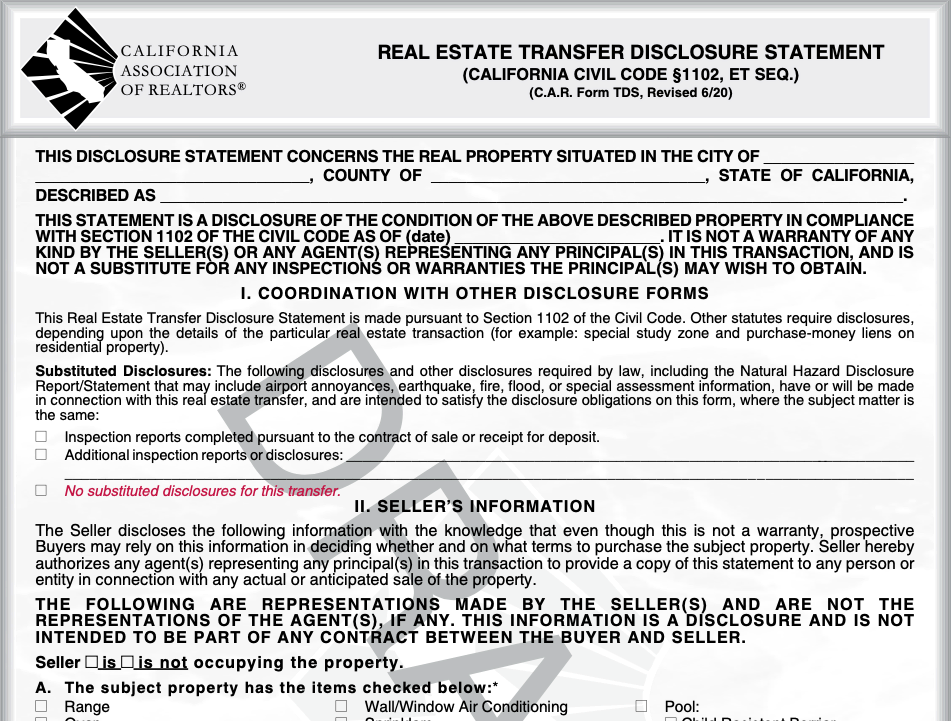
California Seller Disclosures: What Buyers Expect You to Share
Selling a house in California comes with real responsibilities, especially around transparency. In general, you are expected to disclose facts about the property that could affect value, safety, or livability. That includes known defects, past damage, and certain hazards tied to the home or location.
People searching phrases like seller disclosure California, seller property disclosure, seller disclosure before offer, or real estate condition reports California are usually trying to avoid a messy surprise after closing. This guide breaks down what sellers commonly disclose, when disclosures typically happen, and what to do if your situation involves an exempt seller disclosure California scenario.
Quick answer people are looking for
In California, sellers are generally expected to disclose known issues that could materially affect the home. Think water damage, roof leaks, plumbing or electrical problems, foundation cracks, unpermitted work, neighborhood nuisances, HOA restrictions, or location-related hazards. Some sellers may qualify for an exempt seller disclosure California situation, but “exempt” does not usually mean “say nothing” if you know about a serious problem. When in doubt, document what you know and get guidance from a qualified California real estate professional.
Jump to a section:
Disclosure basics
Common mandatory disclosures in California
When disclosures happen and why timing matters
Exempt seller disclosure California: what it usually means
Real estate condition reports and material defects
Previous inspections and repair records
What happens if something is not disclosed
How to complete seller disclosures cleanly
FAQs
Disclosure Basics for California Home Sales
Disclosure in real estate means sharing relevant information about a property with potential buyers. It covers issues that could impact value, safety, or a buyer’s decision to move forward. If you want a deeper primer, disclosure in real estate is often explained as a way to reduce surprises and disputes by putting known facts in writing.
The big idea is simple: buyers should not have to “discover” known problems after closing. Even when a home is being sold as-is, sellers are often still expected to be honest about what they know. If you have paperwork, photos, contractor notes, or insurance claims, those details can help you disclose clearly and avoid confusion later.
What Sellers Commonly Disclose in California
When you sell your house in California, buyers commonly receive a package of forms and reports that cover the home’s condition, known defects, and location-related hazards. Requirements can vary by property type and transaction details, so treat this as a practical overview and confirm the exact forms for your sale with your agent or attorney.
Property condition and “what I know” disclosures
- Transfer Disclosure Statement (TDS) or other condition-based disclosure forms used in your transaction.
- Seller property disclosure details (known defects, repairs, ongoing issues, or recurring problems).
- Past water intrusion, leaks, or staining (see: disclosing water damage).
- Known roof, foundation, electrical, plumbing, HVAC, pest, or drainage concerns.
- Unpermitted work you know about and any documentation you have for improvements.
Hazards, location, and specialty disclosures
- Lead-based paint disclosure for homes built before 1978 (federal requirement).
- Natural hazard zone disclosures (often tied to wildfire, flood, seismic, and other mapped risks).
- Mold-related disclosure considerations when a known problem exists and documentation is available.
- HOA documents and restrictions when the property is in an association.
- Any special local requirements that apply to your city or county.
California seller disclosure form download
If you need the seller disclosure form California buyers frequently ask about, you can use this reference download: California Seller Disclosure Form (PDF).
When Disclosures Happen (and Why “Before Offer” Comes Up)
Many sellers search for seller disclosure before offer because they want to do everything “up front.” In practice, California disclosures are often delivered as part of the transaction process and reviewed during escrow. That said, there is a big difference between what is typical, what is required, and what is smart.
The safer approach is to disclose early enough that the buyer has time to review and ask questions, especially when a known issue could affect pricing or negotiations. If you wait until the last moment to share a major problem, it can create delays, retrades, or cancellations. If you are unsure about timing requirements for your situation, a California real estate attorney or experienced local agent can clarify what applies.
Exempt Seller Disclosure California: What “Exempt” Usually Means
People searching exempt seller disclosure California are often involved in a special type of sale, such as a probate-related transfer, a trustee situation, a foreclosure-related transaction, or a seller who never lived in the property. In some cases, the standard disclosure process can change, and an Exempt Seller Disclosure (ESD) may be used instead of certain forms.
The important takeaway: exemption does not automatically erase the expectation of honesty. If you know about a serious defect, hazard, or ongoing issue, failing to disclose can still create risk. When exemption might apply, it is worth getting clear guidance on which forms are required for your sale and what information you should still provide based on what you know.
Real Estate Condition Reports in California: What Counts as a Material Issue
“Material” generally means the information could affect a buyer’s decision or the property’s value. That is why California seller property disclosure questions often focus on recurring problems and anything that suggests hidden damage.
Examples that commonly trigger buyer concern include: recurring roof leaks, evidence of water damage, foundation movement, persistent plumbing backups, electrical hazards, termite history, drainage and grading problems, unpermitted remodel work, boundary or easement disputes, and HOA restrictions that limit rentals or renovations. If you have supporting documents, attach them or reference them so the buyer can understand what happened and what was done.
Previous Inspections, Repair Records, and Contractor Notes
Many sellers ask whether they must disclose a previous inspection. A practical rule is that if you have a report that identifies defects, it becomes difficult to claim you did not know about the issue. Even if you do not order a new inspection, documentation you already have can become part of the conversation when buyers ask questions.
If you obtained prior inspection reports, repair estimates, invoices, permits, warranties, or insurance claim documents, keep them organized. Clear paperwork helps buyers understand what is verified versus what is speculation, and it can reduce last-minute disputes.
If a Seller Does Not Disclose Required Information
When a seller fails to disclose something significant, buyers may claim misrepresentation or fraud, especially if they can show the seller knew about the issue and withheld it. Outcomes can include legal disputes, repair cost demands, or attempts to unwind the deal depending on the facts.
If you want a broader look at how time pressure and legal exposure can collide during a sale, see: what happens when deadlines tighten and options shrink. (This article is general information, not legal advice. Always confirm your obligations in your specific California transaction.)
How to Complete Seller Disclosures Cleanly
- Gather information: collect paperwork tied to the property (repairs, receipts, permits, warranties, insurance claims, and inspection notes), plus any known issues that have come up over time.
- Write it plainly: list what happened, when you discovered it, and what you did about it. If something is unresolved, say so directly. If you do not know, avoid guessing and consider getting a professional evaluation.
- Keep it consistent: make sure your disclosure answers match your documentation. Consistency reduces buyer distrust and prevents delays.
- Have it reviewed: if you are unsure whether something is required, get guidance from a qualified California real estate professional before you deliver final disclosures.
When repairs are too much, selling as-is can be the cleanest path
If your home needs repairs and you do not want to pour more money into updates, an as-is sale may be a better fit. Friendly Offer buys houses in any condition and can help you avoid long repair lists, repeated showings, and drawn-out negotiations.
If you want to explore options, call (805) 422-7049 or start with a simple request through our site.
Frequently Asked Questions
What is the seller property disclosure in California?
A seller property disclosure generally refers to the written forms and statements that explain what the seller knows about the home’s condition, repairs, defects, and certain risks. The exact forms can vary, but the goal is the same: help buyers understand material issues before they finalize the purchase.
What is an exempt seller disclosure California situation?
An exempt seller disclosure California scenario is when a seller may be treated differently under the rules because of the type of transfer (for example, certain fiduciary, court-ordered, or non-occupant situations). Exemption can change which forms are used, but it does not automatically remove the expectation that known, serious defects should be disclosed.
When do buyers usually receive disclosures?
Timing depends on the transaction, but disclosures are typically delivered early enough for the buyer to review during the contingency and escrow process. Because buyers may renegotiate or cancel based on what they learn, delivering disclosures late can cause avoidable delays and disputes.
Do I have to disclose water damage when selling?
If you know about water intrusion, leaks, past flooding, or recurring moisture problems, it is commonly treated as material information. Buyers care about cause, scope, and whether it was properly repaired. If you want more detail, see: disclosing water damage when selling a house.
Do I need to give buyers my previous inspection report?
If you have prior reports that identify defects, it is wise to treat them seriously. Even when you are not required to order a new inspection, documentation you possess can shape what you are considered to “know,” and buyers often request it during due diligence.
Can I sell a house that needs repairs in California?
Yes. Many owners sell as-is when repairs are costly or time-consuming. If you want to skip repairs and still move on a clear timeline, Friendly Offer can help. Call (805) 422-7049 to talk through your options.

